Are you looking for the perfect eCommerce platform to help your business grow? If so, then you might have heard about Magento and BigCommerce. Both of these platforms are popular in the world of online retail, offering a range of features and benefits. But how do they compare against each other? It can be hard to decide on Bigcommerce vs Magento, which is best for you.
There’s no single answer when deciding which platform is right for your business; however, understanding their features will help guide you toward making an informed decision regarding which solution offers the most value to you. So let’s get started by exploring what makes Magento and BigCommerce stand out from each other!
What’s the Difference Between Magento and BigCommerce?
At their core, Magento and BigCommerce are both powerful ecommerce platforms designed to help businesses create and manage their online stores. To fully understand the differences between Magento and BigCommerce, let’s take a closer look at their definitions and what each eCommerce platform has to offer:
What is Magento Commerce?
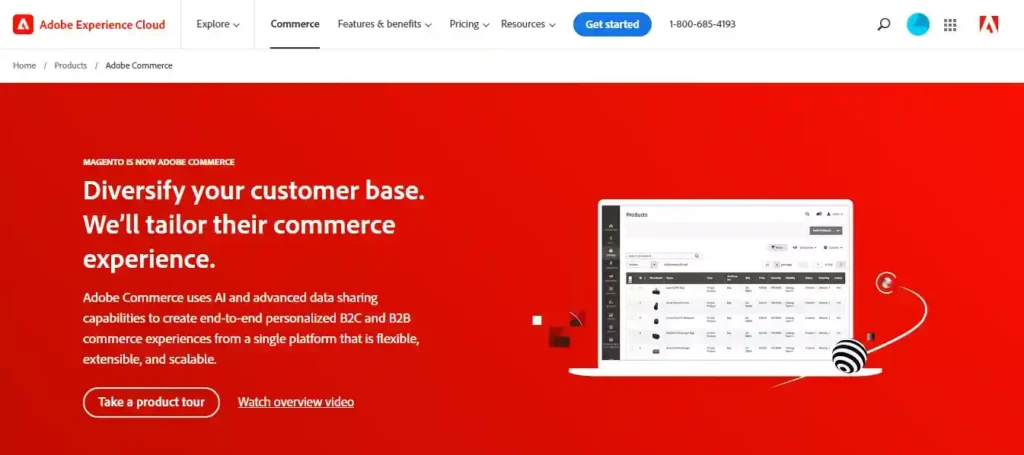
Magento is an open-source ecommerce platform, allowing for extensive customization and flexibility. It is available in two main editions: Magento Open Source, which is free to download and use, and Magento Commerce, a paid version with additional features and support. Magento is owned by Adobe, and its Commerce edition is also referred to as Adobe Commerce.
What does Magento offer?
Magento provides more advanced features than BigCommerce. Magento marketplace allows vendors to promote their own products on the platform while also offering third-party extensions like order management systems or analytics tracking software. Furthermore, this open source platform boasts flexible scalability – meaning business owners have complete control over customization capabilities like design themes and product selection criteria depending on what they need at any given time.
What is the BigCommerce platform?

BigCommerce is a Software-as-a-Service (SaaS) platform offering a hosted solution with a wide range of built-in features and tools. BigCommerce users pay a monthly subscription fee, which includes hosting, support, and access to various features depending on the chosen plan.
What does BigCommerce offer?
BigCommerce offers merchants a wide range of templates and tools to create an online store quickly and easily. With its intuitive user interface, users can get started right away without having any coding experience. Plus, with built-in support for payment processing solutions such as Stripe or PayPal Express Checkout, setting up sales transactions is hassle-free. Additionally, BigCommerce comes with integrated shipping options so customers can track orders from start to finish.
Both platforms provide merchants with reliable hosting plans and secure payment processing methods; however, when comparing BigCommerce vs Magento, both offer unique benefits to help businesses grow their online presence.
BigCommerce vs Magento – Pros & Cons
Before we dive into specific comparisons, let’s take a look at some of the general pros and cons of each platform.
Magento Store
Pros
- Highly customizable and flexible
- Large community and extensive marketplace for extensions
- Scalable for growing businesses
- Strong SEO capabilities
Cons
- It can be challenging for beginners
- Requires more technical knowledge and resources for customization
- Higher costs for development and hosting
BigCommerce store
Pros
- Easy to use and set up
- Built-in features and tools
- Predictable pricing and lower total cost of ownership
- Hosted solution with included support
- 24/7 support, active community forums, webinars
Cons
- Limited customization compared to Magento
- Smaller community and fewer third-party integrations
- Not as robust for enterprise-level businesses
BigCommerce vs Magento: Comparison at a Glance
| Features | Magento Commerce Cloud | BigCommerce Platform |
| Hosting | Hosted on the cloud | Fully-hosted |
| Pricing | Paid version and free open-source version | Several pricing plans based on business size |
| Customization | Highly customizable with thousands of extensions available on the Magento Marketplace | Powerful design editor and numerous apps available on the BigCommerce App Marketplace |
| Features | Advanced catalog management, customizable checkout processes, and various marketing tools | Advanced catalog management, all-in-one eCommerce solution, and various marketing tools |
| Marketing Tools | Email marketing, social media integration, advanced analytics, and built-in SEO features | Email marketing, social media integration, advanced analytics, and an SEO checklist |
| Customer Support | Forums, knowledge base, and resources provided by Adobe Commerce | 24/7 customer support via phone, chat, and email, as well as a comprehensive knowledge base and community forum |
| Payment Gateways | Supports a wide range of payment gateways, including PayPal, Authorize.net, and Stripe | Supports a wide range of payment gateways, including PayPal, Stripe, and Square |
| Security | Regular security patches and updates | PCI compliance and regular security patches and updates |
| Advanced Features | Magento Enterprise offers B2B eCommerce capabilities, advanced inventory management, and customized pricing rules | BigCommerce Enterprise offers multi-channel selling, advanced security features, and custom pricing rules |
| User-Friendliness | Magento can be complex and difficult to use for beginners | BigCommerce offers a user-friendly interface and ease of use |
| Scalability | Magento is highly scalable and can handle larger eCommerce businesses | BigCommerce can handle mid-sized eCommerce businesses, but may not be as suitable for larger businesses |
| Integration | Magento offers integrations with various third-party tools, including payment gateways and marketing automation software | BigCommerce offers integrations with various third-party tools, including shipping providers and accounting software |
| Mobile Responsiveness | Magento provides mobile-responsive templates, but customization may be required | BigCommerce provides fully mobile-responsive templates |
| Open-Source vs SaaS | Magento is open-source, allowing for more customization and control | BigCommerce is a SaaS-based platform, providing an all-in-one solution with limited customization |
| Internationalization | Magento offers more language and currency options for international eCommerce businesses | BigCommerce offers fewer language and currency options |
| Development Community | Magento has a large and active development community, providing ongoing support and resources | BigCommerce has a smaller development community, but still provides support and resources for users |
Note: This table is not an exhaustive list of all features and differences between the two platforms but highlights some of the key differences.
BigCommerce vs Magento Comparison (Full Features Compared)
Pricing
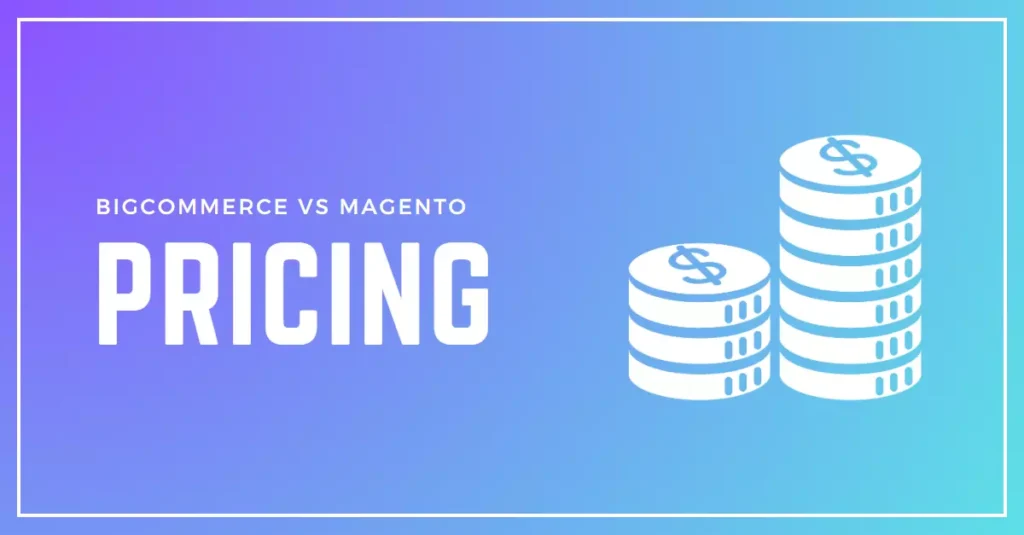
Pricing is a crucial factor to consider when choosing an ecommerce platform. Both ecommerce platforms have different pricing models based on different business needs. Let’s compare the pricing plans offered by both eCommerce platforms:
Magento pricing
Magento offers a flexible pricing structure based on the size of your business.
- Magento Open Source (AKA Magento Community) is available for free, but additional costs for hosting, extensions, and development may apply.
- Adobe Commerce (AKA Magento Enterprise) offers custom pricing based on business size and requirements. At a minimum, the Adobe Commerce edition will cost you $22,000+/year. Adobe Commerce also requires a hosting fee.
- Magento Commerce Cloud (AKA Magento Enterprise Cloud edition) comes with custom pricing.
Magento generally provides better value for larger businesses with specific customization needs.
Choosing the Right Magento Edition
1. Magento Open Source
Suitable for beginners or small online businesses, this edition is budget-friendly and allows for quick online store setup.
2. Magento Commerce Edition
Ideal for B2B enterprises and stores with high traffic, large product catalogs, or high business complexity. This edition offers out-of-the-box features, unlimited customization, seamless third-party integrations, and 24/7 email support.
3. Magento Commerce Cloud Edition
Best for large companies seeking cutting-edge functionality, easy customization, 24/7 support, and a hassle-free hosting solution. This version includes all Magento 2 Commerce features along with an enhanced cloud infrastructure.
BigCommerce pricing
BigCommerce offers transparent and tiered pricing plans, each equipped with essential features to help you start and grow your online business.
- Standard plan – $39 per month
- Ideal for beginners and small businesses
- Sales capped at $50,000 per year
- Basic features to start your online store
- Plus plan – $105 per month
- Most popular option
- Suitable for medium-scale businesses
- Sales capped at $180,000 per year
- Includes customer groups and segmentation, persistent cart, and abandoned cart saver
- Pro Plan – $399 per month
- Designed for larger businesses or those scaling up
- Sales are capped at $400,000 per year (additional fees apply for higher sales)
- Includes Google customer reviews, faceted search (product filtering), and custom SSL
- Enterprise Plan – Custom Pricing
- Custom pricing based on your online sales
- Ideal for fast-growing companies
- Priority support from experts
These prices include hosting and support but exclude any third-party add-ons or payment gateway fees.
Magento vs Commerce: which platform offers better pricing?
Choosing the best platform depends on the specific needs and requirements of your business. If you’re looking for a simple, all-inclusive pricing model, BigCommerce might be the better choice.
On the other hand, if you require a highly customizable solution and are willing to invest in development and hosting, Magento could be a better fit.
Additionally, the Adobe Commerce and cloud editions unlock more features, and you might actually spend less on Magento extensions and modules than on BigCommerce.
Ease Of Use
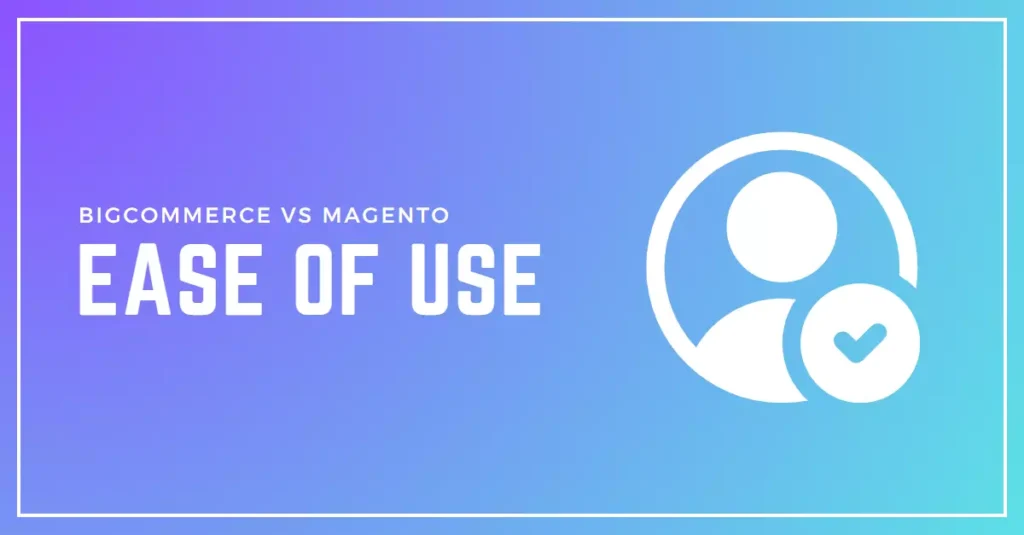
Ease of use is an important factor to consider when choosing an ecommerce platform, as it impacts how quickly and efficiently you can set up and manage your online store.
For Magento users
The latest version of Magento has a user-friendly admin interface that allows non-technical users to undertake more tasks without depending on developers. The navigational menu on Magento 2 has been consolidated to include everything, from customers and products to promotions, sales, and reports, thus making it easy to access different features. Furthermore, its catalog management system allows store owners to efficiently manage their inventory with minimal effort.
However, Magento’s user interface can be complex for those who are not familiar with the platform. It has a steeper learning curve, especially for non-technical users, and setting up a Magento site may require the assistance of a developer. Store management is highly customizable, but this can result in a more challenging user experience. Customizing themes on Magento often requires coding knowledge.
For BigCommerce users
BigCommerce offers an intuitive and easy-to-navigate user interface, making it more accessible to users with varying skill levels. It also has an intuitive dashboard, so you don’t have to spend hours learning how to navigate around it—everything is laid out clearly and logically! The platform provides an easy setup and onboarding process, as well as a streamlined and efficient store management system.
Customizing themes in BigCommerce is much easier as it offers a user-friendly drag-and-drop visual editor that simplifies the process. BigCommerce offers an extensive selection of themes that can help you create beautiful online stores with just a few clicks.
Additionally, the customer accounts feature makes managing customers’ orders simpler than ever before, allowing store owners to keep track of who purchased what and when.
BigCommerce vs Magento: Which platform is more beginner-friendly?
BigCommerce is generally more beginner-friendly than Magento, thanks to its user-friendly interface, built-in features, transparent pricing, and robust customer support. While Magento is an incredibly powerful platform, its complexity and needs for customization make it more suitable for businesses with technical expertise or resources to manage the platform effectively.
BigCommerce vs Magento Ease-of-Use Summary
To help you understand how user-friendly Magento and BigCommerce are, we’ve compared the two platforms based on their ease of use, user interface, and learning curve.
| Aspect | Magento | BigCommerce |
| User interface | Can be complex and requires familiarity | Intuitive and easy to navigate |
| Learning curve | Steeper for non-technical users | Suitable for users with varying skill levels |
| Site setup | May require developer assistance | Easy setup and onboarding process |
| Store management | Highly customizable, but with a steeper learning curve | Streamlined and efficient |
| Theme editing | Requires coding knowledge for customizations | Drag-and-drop visual editor for easy customization |
Ecommerce Tools And Features
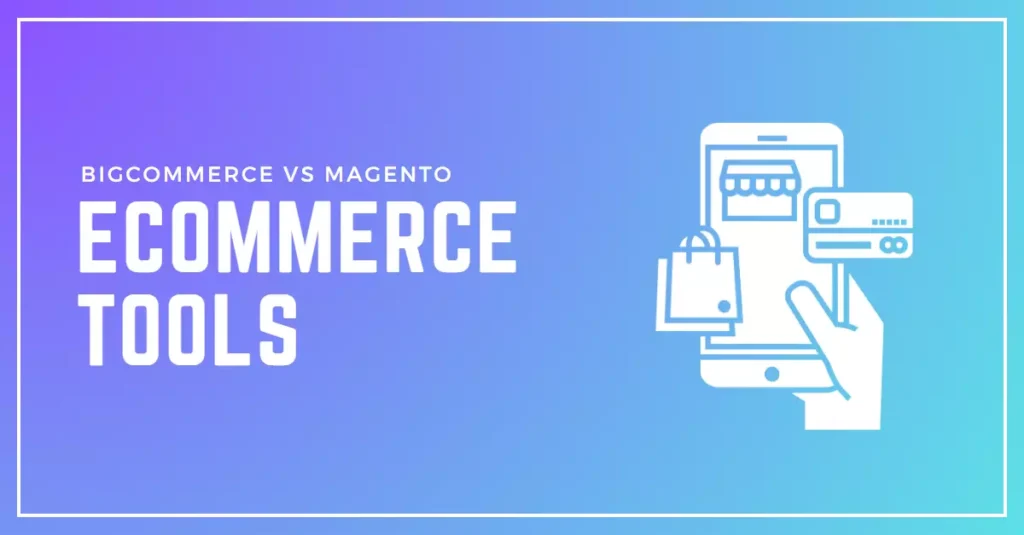
When it comes to building an ecommerce website, one must consider the tools and features available on both platforms before making a choice. Let’s take a look at what each has to offer:
Magento platform
Magento provides users with hundreds of advanced extensions and modules for customizing their stores. It also offers powerful marketing capabilities such as coupons, discounts, product comparison features, newsletter integration, etc.
BigCommerce platform
BigCommerce is known for its easy setup process that allows new users to quickly get up and running with their own online stores. Furthermore, it offers integrated payment processing solutions along with analytics and reporting capabilities.
BigCommerce vs Magento ecommerce tools comparison
To help you better understand the eCommerce tools and features offered by Magento and BigCommerce, we’ve compared the two platforms based on their product and catalog management, inventory management, shipping and tax settings, and marketing tools.
Product and Catalog Management
Magento
- Advanced options with a wide range of possibilities
- Highly customizable, catering to diverse business requirements
BigCommerce
- Comprehensive built-in tools
- User-friendly interface for managing products and catalogs
Inventory Management
Magento
- In-depth inventory control
- It may require extensions to unlock the full potential
BigCommerce
- Basic inventory management
- Expandable with apps for more advanced needs
Shipping and Tax Settings
Magento
- Highly customizable settings
- May require extensions for specific needs
BigCommerce
- User-friendly configuration
- Real-time shipping quotes for a seamless customer experience
Marketing Tools
Magento
- Extensive toolset available
- May need extensions for full functionality
BigCommerce
- Robust marketing tools built into the platform
- Simplifies marketing efforts for businesses
Ecommerce Tools Summary
| Aspect | Magento | BigCommerce |
| Product and catalog management | Advanced, with a wide range of options | Comprehensive, with built-in tools |
| Inventory management | In-depth inventory control with extensions | Basic inventory management, expandable with apps |
| Shipping and tax settings | Highly customizable, but may require extensions | User-friendly, with real-time shipping quotes |
| Marketing tools | Extensive, but may need extensions for full functionality | Robust marketing tools built into the platform |
BigCommerce vs Magento: Which Platform Has Better Functionality?
Both Magento and BigCommerce provide plenty of features for creating successful ecommerce websites.
Performance And Security
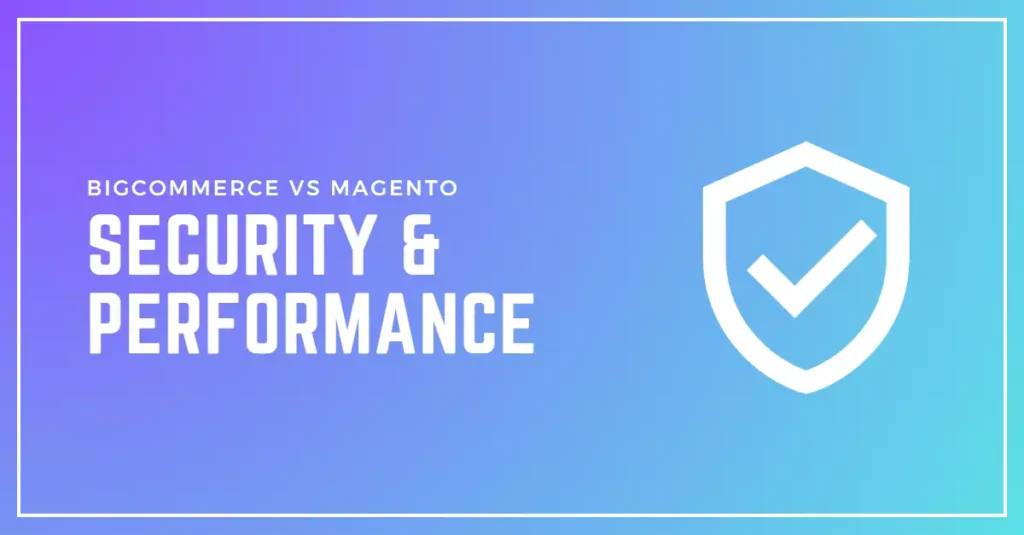
Performance and security are important factors to consider before choosing an ecommerce platform for your online store. To help you understand the performance and security of Magento and BigCommerce, we’ve compared the two platforms based on their site speed, security features, and maintenance requirements.
Site Speed
Magento
- Varies depending on hosting, optimization, and extensions
- Regular maintenance and optimization essential for optimal performance
- Built-in monitoring and reporting tools that ensure uptime and performance optimization of your Magento site.
Learn How to optimize your Magento store.
BigCommerce
- Generally faster with optimized hosting
- Reduced need for manual performance optimization
Security Features
Magento security
- Strong security features, but may require manual updates and patches
- Magento Commerce Cloud offers integrated PCI compliant payment gateways, CDNs, and caching solutions
BigCommerce security
- Comprehensive security features with automatic updates and patches
- Supports major credit card payments, PayPal, Amazon Pay, Apple Pay, and more
- Multiple layers of protection against data breaches and cyberattacks
Maintenance Requirements
Magento
- Higher maintenance requirements, with the need for regular updates and optimization
- Built-in monitoring and reporting tools for Magento Commerce Cloud
BigCommerce
- Lower maintenance requirements, as the platform takes care of updates and optimization
- Reliable hosting services with maximum uptime
BigCommerce vs Magento: Security and performance summary
| Aspect | Magento | BigCommerce |
| Site speed | Varies depending on hosting, optimization, and extensions | Generally faster, with optimized hosting |
| Security features | Strong, but may require manual updates and patches | Comprehensive, with automatic updates and patches |
| Maintenance requirements | Higher, with the need for regular updates and optimization | Lower, as platform takes care of updates and optimization |
BigCommerce vs Magento: Which Platform Provides Better Protection and Speed for Your ecommerce Website?
Both Magento and BigCommerce offer strong performance and security features, but they differ in their maintenance requirements. Magento’s security features are strong but may require manual updates and security patches, which can be time-consuming and resource-intensive.
Read 12 essential Magento security tips to protect your stores.
Payment Options And Fees
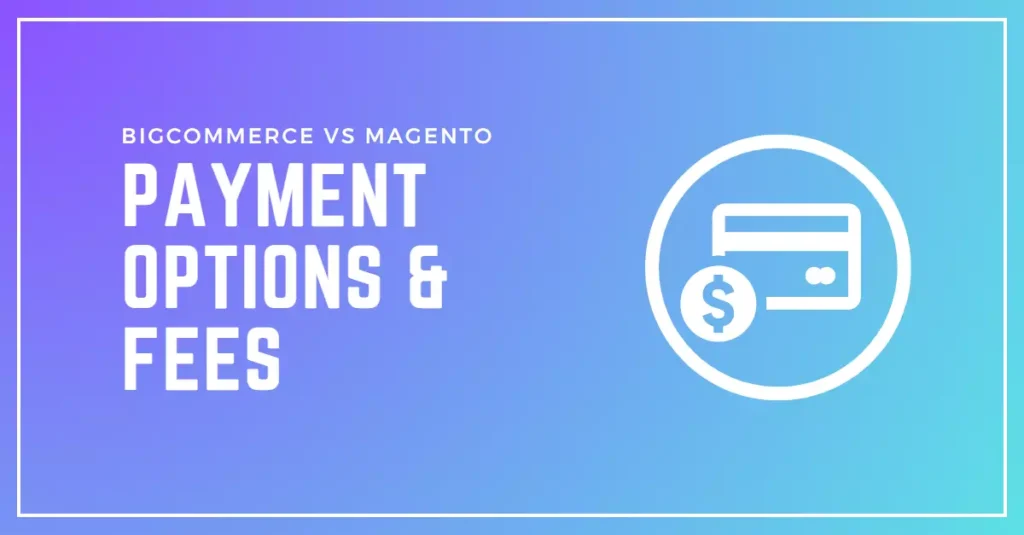
Both platforms offer robust payment options with various fees, but each platform has distinct advantages that must be weighed carefully. Let’s explore how the two compare in terms of payment options and transaction fees.
Integrated Payment Options
Magento
- Supports three payment methods out of the box: PayPal, Braintree, and Authorize.net
- Over 450 payment gateway apps available in the Magento Marketplace
- API-led architecture allows for the integration of local payment gateways to meet customer preferences in specific markets.
BigCommerce
- Offers over 65 integrated payment options, such as PayPal, Stripe, Square, Apple Pay, Authorize.net, and more
- Doesn’t support some local payment gateways like Swedbank, SEB, etc.
Transaction Fees and Credit Card Rates
Magento
- Requires third-party payment methods, which may incur additional fees
- Integration may take time and effort
BigCommerce
- No transaction fees on all price plans
- Credit card rates (optional) vary depending on the plan, with higher plans offering lower rates
| Plan | Credit Card Rate |
| Standard | 2.59% + $0.49 per transaction |
| Plus | 2.35% + $0.49 per transaction |
| Pro | 2.05% + $0.49 per transaction |
| Enterprise | 2.05% + $0.49¢ or lower per transaction |
BigCommerce vs Magento: Payment Options and fees summary
| Aspect | Magento | BigCommerce |
| Supported payment gateways | Wide range of options, with flexibility to add more | Over 65 integrated payment gateways, including popular choices |
| Transaction fees | No platform-specific fees, but payment gateway fees apply | No transaction fees, but payment gateway fees apply |
| Additional charges | May incur costs for hosting, extensions, and development | Monthly plan fees, potential app costs |
Payment Options and Fees: How Do Magento and BigCommerce Compare?
It’s clear that both BigCommerce and Magento offer plenty of flexibility when it comes to accepting payments from customers online.
BigCommerce allows for quicker and easier integration of payment processors without transaction fees on any pricing plan. However, it lacks support for some local payment gateways.
Magento, on the other hand, requires apps for payment gateway integration, which may cost extra fees but provides more flexibility and support for international businesses with its API-led architecture.
Your choice will depend on your ecommerce business needs and preferences regarding payment options and transaction fees.
Marketing Tools
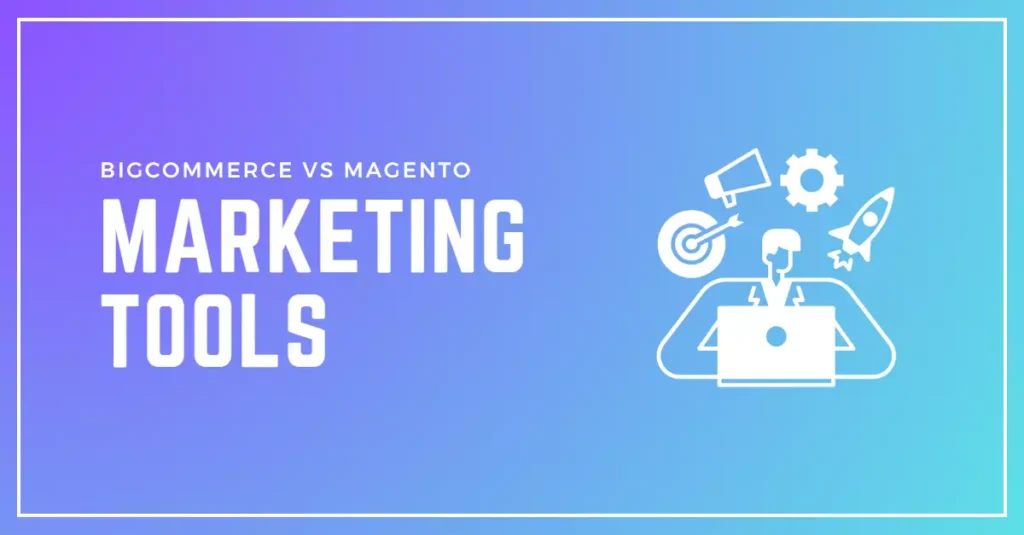
When comparing Magento and BigCommerce, marketing tools and features play a significant role in the decision-making process. Let’s examine what each platform offers for ecommerce businesses seeking strong SEO capabilities and effective digital marketing strategies.
Magento Marketing Tools
Magento offers a variety of powerful marketing tools suitable for businesses of all sizes:
- Built-in feature sets, such as discount code management, customer engagement tracking, automated email triggers, personalized content recommendations, loyalty programs, and social media integration
- Access to the Magento marketplace, which offers numerous extensions for SEO optimization, analytics software, keyword research platforms, and link-building services
BigCommerce Marketing Tools
BigCommerce provides a comprehensive app marketplace with a wide range of integrated apps and third-party plugins to maximize SEO performance:
- Access to external sources like Google Ads or Facebook Dynamic Product Ads for targeted campaigns within search engine results pages (SERPs)
- Internal SEO features, including optimized product descriptions, meta tags, and URL redirects for deleted products or categories
BigCommerce vs Magento: Marketing tools and features summary
| Aspect | Magento | BigCommerce |
| SEO capabilities | Strong, but may require extensions for advanced features | Built-in, with advanced features available |
| Email marketing integration | Possible through extensions | Built-in, with support for popular email marketing services |
| Social media integration | Requires extensions for seamless integration | Native integration with social media platforms |
BigCommerce vs Magento: Which Platform Offers Better Marketing Capabilities?
When comparing Magento and BigCommerce from a marketing perspective, there is no clear winner. Both platforms provide excellent support for online retailers looking to boost their visibility in SERPs through powerful SEO capabilities and features.
BigCommerce offers comprehensive built-in marketing tools and features, while Magento provides strong marketing capabilities but often requires extensions to unlock its full potential.
Your choice will depend on your business’s specific needs and preferences regarding marketing tools.
Help And Support

Having reliable and responsive support is crucial when things go wrong. Magento and BigCommerce both offer different levels of assistance to cater to store owners’ needs. The quality of available help and support can significantly impact an ecommerce business’s success. Let’s compare the two platforms in terms of their help and support resources:
Magento Help and Support
- Magento Commerce users have access to customer support through email, phone, and chat.
- Magento Open Source users can access an extensive collection of Magento forums, documentation, and online resources for help and support.
- Businesses using Magento can hire Magento partners and developers for professional services, including development, design, and consulting.
Get expert assistance from Top Magento Tech Support Firms
BigCommerce Help and Support
- BigCommerce provides 24/7 phone, email, and chat support for users across all plans.
- The platform has an active community, documentation, and online resources for users to access support and guidance.
- Businesses using BigCommerce can seek professional services from BigCommerce partners and experts, including development, design, and consulting.
BigCommerce vs Magento: Help & Support Summary
| Aspect | Magento | BigCommerce |
| Customer support channels | Email, phone, and chat (for Magento Commerce users) | 24/7 phone, email, and chat support for all plans |
| Community resources | Extensive forums, documentation, and online resources | Active community, documentation, and online resources |
| Professional services | Magento partners and developers available for hire | BigCommerce partners and experts available for hire |
BigCommerce vs Magento: Which Platform Offers Better Assistance?
BigCommerce offers more comprehensive customer support channels for all users, while Magento provides robust support primarily for Magento Commerce users.
Both platforms have extensive community resources and professional services available to assist businesses in achieving their goals.
Your choice will depend on the level of support you require and the specific resources that best meet your business’s needs.
Design Flexibility
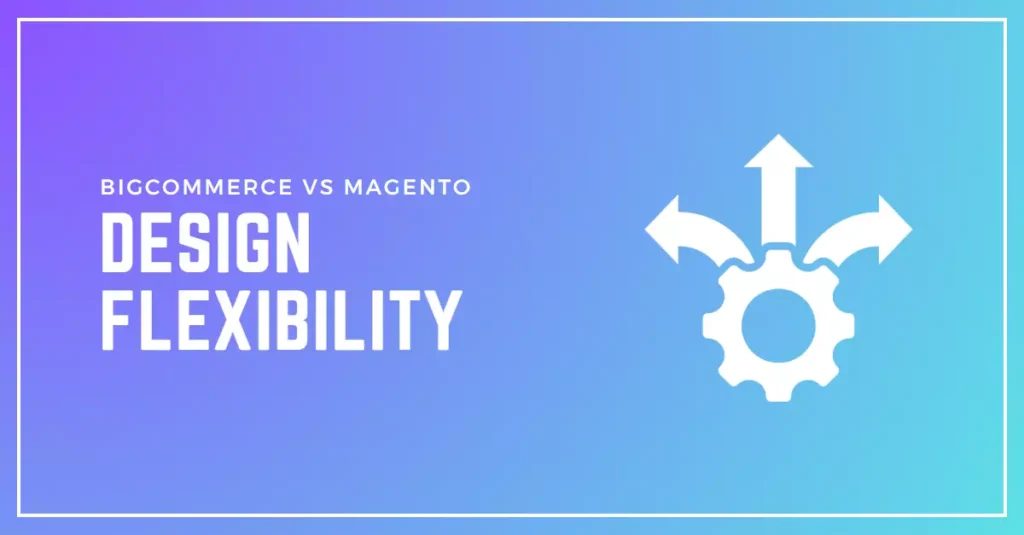
The look and feel of an ecommerce platform are crucial, as it creates the first impression shoppers have of a brand. That’s why when shopping for an ecommerce platform, themes, templates, apps and extensions are key considerations.
Magento and BigCommerce offer a variety of options that could help you customize the look and feel of your online store.
Themes & Templates
BigCommerce Themes
- Offers 15 free themes and 100+ paid options, ranging from $150 to $399 each
- All themes are mobile responsive and easy to customize with the help of Stencil, BigCommerce’s front-end development framework.
Magento Themes
- Provides seven theme options, both free and paid
- Allows users to create their own theme from scratch, but this requires in-depth coding knowledge or hiring developers
Apps & Extensions
BigCommerce Apps
- Offers strong built-in features, such as abandoned cart reminders and analytic tools
- Supports over 600 BigCommerce apps in various categories, including marketing, analytics, payment, and security
Magento Extensions
- Provides powerful built-in features, such as integrated checkout, payment, shipping, and catalog management
- Offers 3670+ extensions in all categories on Magento Marketplace
BigCommerce vs Magento: Design Flexibility Summary
| Aspect | Magento | BigCommerce |
| Theme & extension options | Extensive selection of free and paid themes and extensions | Smaller selection of free and premium themes and extensions |
| Customization capabilities | Highly customizable with coding knowledge | User-friendly, with drag-and-drop visual editor |
| Ease of design implementation | May require developer assistance | Simplified, no-coding-required customization |
| Mobile responsiveness | Depends on the theme, but generally responsive | Responsive design built into most themes |
| Design uniqueness | Allows for fully unique designs with custom coding | Unique design possible with customization options |
BigCommerce vs Magento: Which Platform Offers More Customization Options?
No matter what type of ecommerce store you’re building, both BigCommerce and Magento offer many robust integrated functions and support a wide range of extensions on their marketplaces.
However, Magento is the winner in terms of extension quantity. When it comes to design flexibility, Magento offers more options, but BigCommerce provides a more user-friendly experience.
Search Engine Optimization (SEO) Features

When it comes to ecommerce sites, SEO is a critical factor for success. Magento and BigCommerce both offer comprehensive search engine optimization (SEO) features that you can use to make sure your site shows up in the top results on Google and other search engines:
Key SEO Features
Sitemap Generation
Sitemaps are an essential tool for getting more visibility on Google and other major search engines.
Magento provides an automated feature that creates a sitemap based on your product catalog, while BigCommerce offers built-in support for generating XML sitemaps.
Optimizing Page Titles and Meta Tags
Both platforms provide advanced features such as setting custom page titles/meta descriptions so you can control how your pages show up in search engine results. This helps you optimize each page of your website for the right keyword phrases, driving more organic traffic from search engines.
Utilize social media integration
You can connect your BigCommerce website with popular social networks like Twitter and Facebook, allowing customers to easily share products they find on your store, which increases exposure in the SERPs (Search Engine Results Pages).
With Magento, users have access to numerous third-party extensions that allow them to integrate their stores with various social networks.
BigCommerce vs Magento: SEO features summary
| Aspect | Magento | BigCommerce |
| Built-in SEO capabilities | Strong, but may require extensions for advanced features | Comprehensive built-in SEO features |
| URL and metadata customization | Extensive customization options available | User-friendly customization options available |
| Site performance optimization | Requires optimization efforts, such as caching and image compression | Built-in performance optimization features |
BigCommerce vs Magento: which platform is better in terms of SEO capabilities?
Both Magento and BigCommerce provide powerful tools for optimizing ecommerce websites for better visibility in search engine rankings.
BigCommerce offers comprehensive built-in SEO features and performance optimization options, while Magento provides strong SEO capabilities but may require additional effort and extensions for optimal results.
Also, read Magento SEO Best Practices
Multi Channel Integration
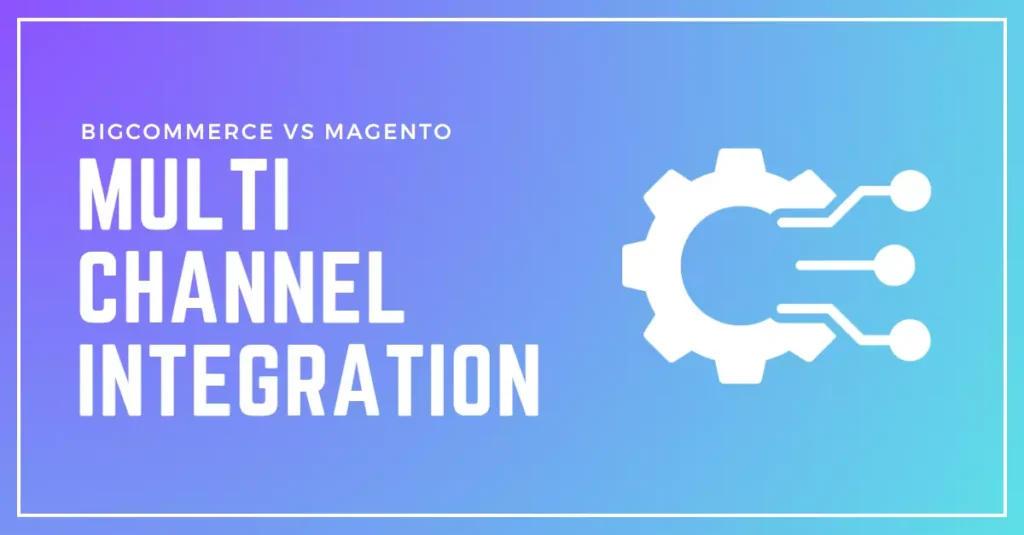
Magento and BigCommerce are two e-commerce platforms offering a wide range of services for online stores. Both offer great SaaS solutions as well as hosted solutions and provide users with an extensive ecommerce infrastructure. Let’s explore the differences between these two platforms:
Magento Multi-Channel Integration
Magento offers advanced APIs, which enable users to build custom integrations between their store and third-party service providers. While this approach allows for greater potential, it requires technical expertise or the support of developers who specialize in API integrations. Some key aspects of Magento’s multi-channel integration include:
- The need for a multi-channel selling tool (e.g., LitCommerce) to integrate with marketplaces like Facebook, Pinterest, Instagram, eBay, and Amazon.
- The requirement of purchasing SEO extensions on the Magento Marketplace for website ranking.
- The use of third-party extensions for multi-channel selling.
BigCommerce Multi-Channel Integration
BigCommerce excels in providing an easy solution for merchants looking to integrate all their channels into one place. The platform has built-in Sales channel features that allow you to:
- Streamline product data management across channels like Google Shopping, eBay, and Amazon.
- Manage inventory levels centrally.
- Track orders efficiently in real time.
BigCommerce’s out-of-the-box setup makes it simpler for businesses to connect to multiple sales channels without requiring extensive technical knowledge.
BigCommerce vs Magento: Multi-Channel integration features summary
| Aspect | Magento | BigCommerce |
| Marketplace integrations | Requires extensions for most popular marketplaces | Native integrations with popular marketplaces |
| Social media integrations | Requires extensions for seamless integration | Built-in integrations with social media platforms |
| Omni-channel retailing support | Possible through extensions and custom development | Built-in features and partner integrations |
BigCommerce vs Magento: Which platform offers better multi-channel integrations?
BigCommerce offers more comprehensive built-in multi channel integration features, while Magento provides robust multi-channel capabilities but often requires extensions or custom development to unlock its full potential.
Scalability
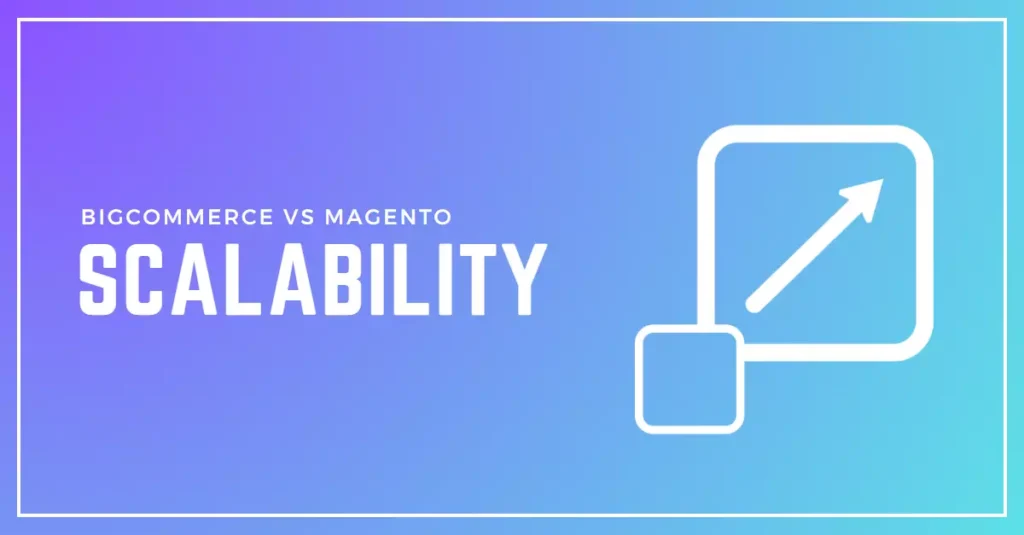
To better understand the scalability of Magento and BigCommerce, let’s evaluate the platforms based on their ability to accommodate growing businesses, the ease of upgrading plans, and their flexibility in scaling with your business needs.
Handling Growing Businesses
Magento is highly scalable and can effectively support growing businesses with the right infrastructure and development efforts. However, it may require more resources and technical expertise to achieve optimal performance.
BigCommerce, as a scalable platform, automatically provides upgrades and allocates resources as needed to accommodate business growth. This generally results in a more seamless experience for business owners.
Ease of Upgrading Plans
Upgrading plans with Magento (e.g., from Open Source to Commerce) can involve complex migrations and additional development work, which may require more time and effort.
On the other hand, upgrading BigCommerce plans is typically a smooth process with minimal disruptions to your online store, making it more user-friendly in this aspect.
Flexibility in Scaling
Magento offers high flexibility in scaling due to its self-hosted nature and the ability to customize options. This allows businesses to tailor the platform to their specific needs and preferences.
BigCommerce, being a SaaS platform, has some limitations in terms of customization options, which may impact businesses with unique scaling requirements.
BigCommerce vs Magento Scalability Summary
| Aspect | Magento | BigCommerce |
| Handling growing businesses | Highly scalable with the right infrastructure and development efforts | Scalable, with automatic upgrades and resources as needed |
| Ease of upgrading plans | May require complex upgrades and migrations | Seamless plan upgrades with minimal disruptions |
| Flexibility in scaling | High flexibility with self-hosted and custom options | Limited customization options on SaaS platform |
BigCommerce vs Magento: which ecommerce platform is better for scaling your online business?
Both Magento and BigCommerce can effectively support growing businesses. However, Magento offers greater flexibility in scaling through self-hosting and custom options but may require more resources and technical expertise.
On the other hand, BigCommerce provides a more seamless experience when upgrading plans and resources but has limitations due to its SaaS nature.
Ultimately, the choice between Magento and BigCommerce for scalability will depend on your business’s specific needs, resources, and technical capabilities.
Wrapping It Up
Choosing between Magento and BigCommerce can be a difficult decision. It’s important to weigh the pros and cons of each platform in order to decide which one best suits your business needs. Ultimately, you’ve got to think about your business’s specific needs, the resources you have, and your technical know-how.
Now, if you’re after a super customizable and flexible platform that packs a punch with its features and scalability, Magento could be your go-to choice. But keep in mind you might need a bit more technical expertise and elbow grease to get the most out of it and keep things running smoothly.
On the flip side, if you’re in search of a user-friendly, all-inclusive ecommerce solution with a whole bunch of built-in features and hassle-free scalability, BigCommerce might just be your perfect match. Although customization options could be a tad limited due to its SaaS nature, managing and maintaining this platform generally won’t demand as much technical skill or resources.
So, the final call between Magento and BigCommerce really depends on your unique business needs and objectives. By weighing the pros and cons of each platform and lining them up with your goals, you’ll be well on your way to picking the best ecommerce partner to help your online business soar with the right ecommerce platform.

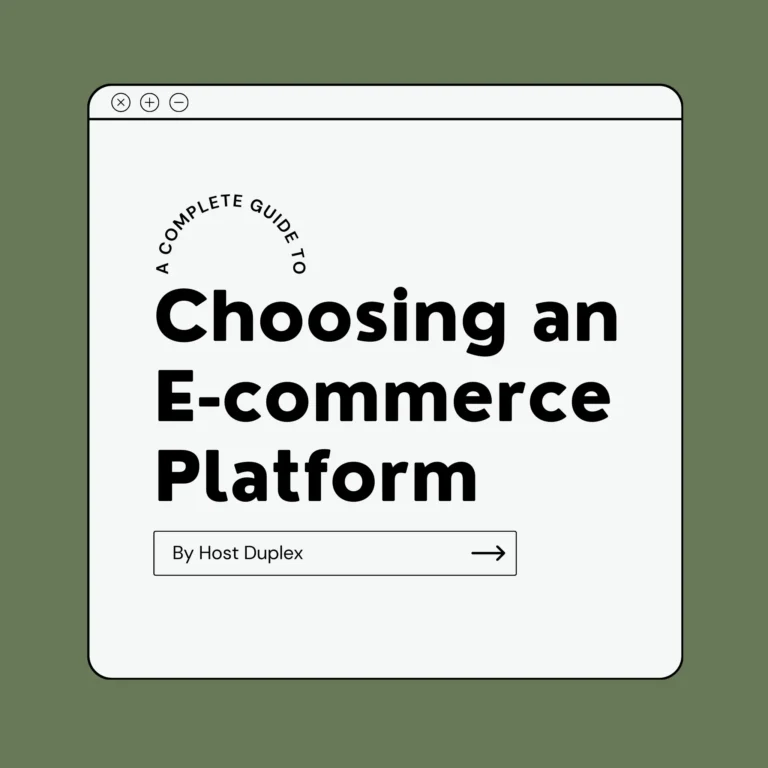
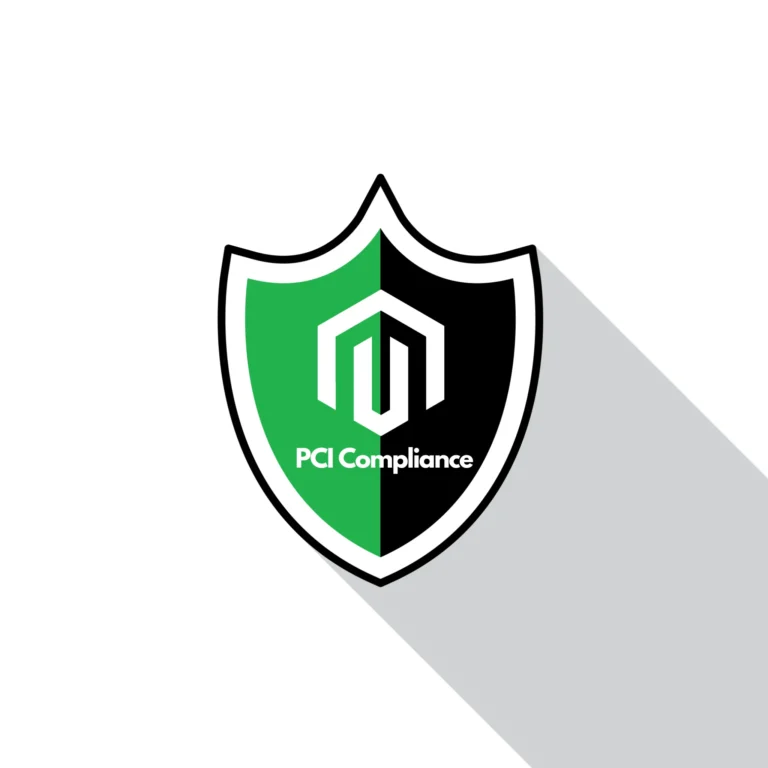
BigCommerce vs Magento: Which is the Better E-commerce Platform? (2023)